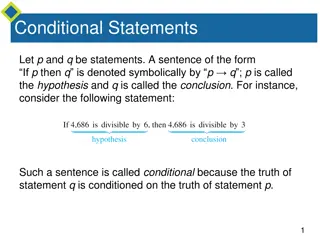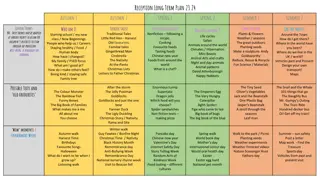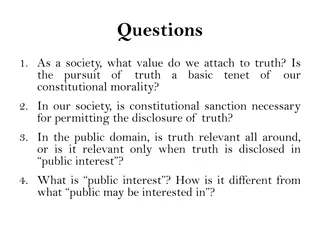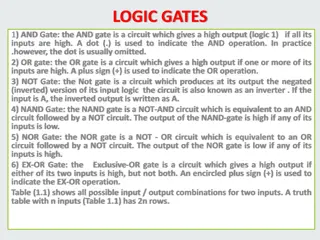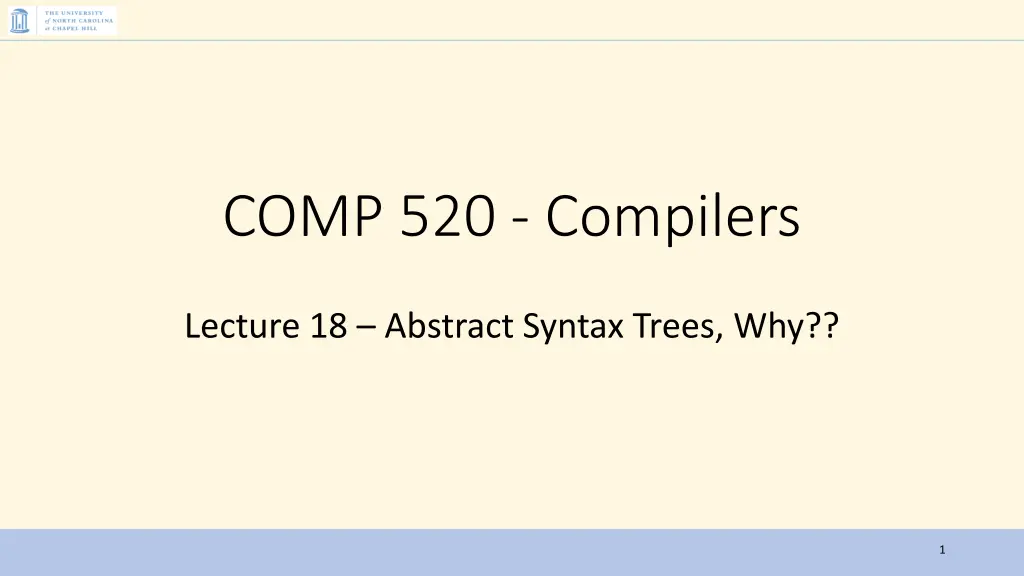
Understanding Abstract Syntax Trees in Compilers
Explore the significance of Abstract Syntax Trees (ASTs) in compilers, uncovering their role in simplifying coding processes and enhancing efficiency. Learn why ASTs are integral and how they impact the development of compilers fundamentally.
Download Presentation

Please find below an Image/Link to download the presentation.
The content on the website is provided AS IS for your information and personal use only. It may not be sold, licensed, or shared on other websites without obtaining consent from the author. If you encounter any issues during the download, it is possible that the publisher has removed the file from their server.
You are allowed to download the files provided on this website for personal or commercial use, subject to the condition that they are used lawfully. All files are the property of their respective owners.
The content on the website is provided AS IS for your information and personal use only. It may not be sold, licensed, or shared on other websites without obtaining consent from the author.
E N D
Presentation Transcript
COMP 520 - Compilers Lecture 18 Abstract Syntax Trees, Why?? 1
Reminders Midterm 2 on Thursday, 4/11 Make sure you have some experience in PA4 2 COMP 520: Compilers S. Ali
Announcements I have finished reading all PA3 submissions done by Sunday night (keep working if you re not done). This lecture is targeted towards making sure we all understand the power of ASTs. 3 COMP 520: Compilers S. Ali
Announcements (2) A small portion of you maximized AST potential. A good portion nearly maximized their potential, and a good portion had a lot of redundant code. Today we uncover the secrets of ASTs. 4 COMP 520: Compilers S. Ali
Why are we using ASTs? Is it just some arbitrary decision that is just one way to do Compilers ? 5 COMP 520: Compilers S. Ali
Why are we using ASTs? Is it just some arbitrary decision that is just one way to do Compilers ? Yes and no. Yes it is, but it makes life easier for us. No, it will make life harder for you otherwise, so we should learn ASTs. Examples of no : bogo sort (Note: with some language exceptions, ASTs can look vastly different, but the core concept remains the same). Today s question: did ASTs make our lives easier? 6 COMP 520: Compilers S. Ali
Visitor Model A quick review 7 COMP 520: Compilers S. Ali
AST public abstract abstract class AST { public abstract abstract <A,R> R visit(Visitor<A,R> v, A o); } This is an abstract class. This method is not defined. 8 COMP 520: Compilers S. Ali
AST (2) public abstract class AST { public abstract <A,R> R visit } visit(Visitor<A,R> v, A o); Visit is defined in concrete classes: 9 COMP 520: Compilers S. Ali
Concrete Visit Method Let s build the framework to see this in action. 10 COMP 520: Compilers S. Ali
Recall Recall Creating Statement Lists So long as input isn t a }, keep giving me an abstract Statement object returned by parseStatement(); 11 COMP 520: Compilers S. Ali
A peek into parseStatement This method will return a Statement. What kind of statement? No idea! BlockStmt, which extends Statement and has a defined visit method. ReturnStmt, which extends Statement and has a defined visit method. WhileStmt, which extends Statement and has a defined visit method. 12 COMP 520: Compilers S. Ali
A peek into visitStatement (2) This method will return a Statement. What kind of statement? No idea! BlockStmt, which extends Statement and has a defined visit method. ReturnStmt, which extends Statement and has a defined visit method. WhileStmt, which extends Statement and has a defined visit method. 13 COMP 520: Compilers S. Ali
Calling an Abstract Method ME=Identification I don t know what type this Statement s is, but I know it was instantiated with a REAL visit method Why? 14 COMP 520: Compilers S. Ali
Calling an Abstract Method (2) During runtime, the visit method maps here for this particular example Statement (Afterall, it had to be instantiated somehow) Statement is WhileStmt 15 COMP 520: Compilers S. Ali
Calling an Abstract Method (3) Parameter and Argument. When visiting, the first parameter is always this 16 COMP 520: Compilers S. Ali
Calling an Abstract Method (4) So this WhileStmt WhileStmt s visit method just calls the CALLER s visitWhileStmt visitWhileStmt method. 17 COMP 520: Compilers S. Ali
Calling an Abstract Method (5) ME This means, s.visit( ) code is equivalent to: if( s if( s instanceof instanceof WhileStmt WhileStmt ) ) visitWhileStmt visitWhileStmt( s, Call MY visitWhileStmt ( s, arg arg ); ); 18 COMP 520: Compilers S. Ali
PA2 - ASTs In case you forgot, you instantiated the concrete classes in PA2 in your parser. So when you instantiated a concrete VardeclStmt , you specified if you visit this Statement, make sure you pair it with visitVarDeclStmt for whoever the visitor is. 19 COMP 520: Compilers S. Ali
The Terrifying, Terrific, Tantalizing, Tormenting Truth of ASTs Elegantly combine parsing and input code traversal. 20 COMP 520: Compilers S. Ali
Identification Consider wanting to implement this: visitIdentifier( Identifier id, String ctx ) ::= id.decl = findDeclaration( ctx, id ); return id.decl; (It won t know the context, needs it to be passed in) 21 COMP 520: Compilers S. Ali
Package Package contains: ClassDeclList, which is just a list of ClassDecls Parser: parseClassDecl- Returns a ClassDecl. Add each ClassDecl into our list 22 COMP 520: Compilers S. Ali
ClassDecl Contains a FieldDeclList (member variables) and MethodDeclList (member methods) If it was a method, you would parseStatement until out of statements, and store that in the MethodDecl. 23 COMP 520: Compilers S. Ali
Visiting a Method Thus, when you visit the Statements in a MethodDecl, you visit the Statement objects that you instantiated in PA2. Those statements contained Expressions that you also created in PA2. 24 COMP 520: Compilers S. Ali
The Mysteries of References 25 COMP 520: Compilers S. Ali
Recall Recall: Creating References Grammar: Reference ::= id | this | Reference . id Improved: (this|id)(.id)* 26 COMP 520: Compilers S. Ali
Recall Recall: Creating References (2) Implies: only three types of references. IdRef, ThisRef, QualRef. Confirmed 27 COMP 520: Compilers S. Ali
Note: If Identifiers have a Decl, then References map to a Decl too! 28 COMP 520: Compilers S. Ali
Note: If Identifiers have a Decl, then References map to a Decl too! Thus, references map to some memory location. See CFGs: Reference [ Expression ] Reference ( ArgumentList? ) Reference = Expression ; - Reference because it must be a variable - Reference because it must be a method - Reference because need to store data. Makes sense, use references to refer to something whereas expressions need to be evaluated. 29 COMP 520: Compilers S. Ali
Parsing VS Grammar Grammar: Reference ::= id | this | Reference . id Parsing: Reference ::= (this|id)(.id)* Parsing is misleading! 30 COMP 520: Compilers S. Ali
Parsing VS Grammar (2) Grammar: Original: Reference ::= id | this | Reference . id Try this: QualRef ::= (ThisRef|IdRef)(.id)+ Useful to view them as AST grammars instead! Question: What is the only repeating component? 31 COMP 520: Compilers S. Ali
Parsing VS Grammar (3) Grammar: Reference ::= id | this | Reference . id Try this: QualRef ::= (ThisRef|IdRef)(.id)+ The only repeating element is identifiers. AST Example: IdRef . Identifier . Identifier . Identifier 32 COMP 520: Compilers S. Ali
IdRef Thus, if you visit an IdRef, Then it was either a plain id used as a reference, or the left-most identifier in a QualRef. THEREFORE: visitIdRef is ALWAYS in the context of the current class. 33 COMP 520: Compilers S. Ali
IdRef (2) Thus, if you visit an IdRef, Then it was either a plain id used as a reference, or the left-most identifier in a QualRef. THEREFORE: visitIdRef is ALWAYS in the context of the current class. And the implementation for PA3 is visitIdRef ::= ref.id.visit( this, currentClassName ); // (CTX is currentClass) 34 COMP 520: Compilers S. Ali
IdRef (Recall visitIdentifier) visitIdRef ::= ref.id.visit( this, currentClassName // Do checks for non-static in static method Question: do I need a private check here? currentClassName ); visitIdentifier( Identifier id, String id.decl = findDeclaration( ctx, id ); String ctx ctx ) ::= 35 COMP 520: Compilers S. Ali
The mysteries of RefExpr 36 COMP 520: Compilers S. Ali
Recall Fail351.java Method, not variable. 37 COMP 520: Compilers S. Ali
Recall: Recall: CallExpr / CallStmt Grammar: CallStmt ::= Reference ( ArgumentList? ) ; CallExpr ::= Reference ( ArgumentList? ) ; RefExpr ::= Reference ; 38 COMP 520: Compilers S. Ali
You did this in PA2 Instantiate a CallExpr vs RefExpr 39 COMP 520: Compilers S. Ali
You did this in PA2 (2) DISJOINT CASES 40 COMP 520: Compilers S. Ali
Thus, PA3 check becomes easier. If it is a RefExpr, then it is not a CallExpr. Therefore, visitRefExpr, if the reference s declaration is a MethodDecl, then it is wrong. E.g. x = someFn; instead of x = someFn(); In a CallExpr, if the reference s declaration is NOT a MethodDecl, then it is wrong. E.g. int x = 0; int y = 0; y = x(); 41 COMP 520: Compilers S. Ali
The mysteries of QualRef 42 COMP 520: Compilers S. Ali
Figuring out QualRef Returned Declaration after a Visit Left-hand-side Notes Notes 2 First question: An identifier on the RHS of a QualRef is at what level of SI? Identifier: CLASSNAME Declaration: ClassDecl RHS must be a static ?? If the RHS is declared in a different class, RHS cannot be private. Identifier: this Declaration: ClassDecl RHS must be a ?? Identifier: NAME (not a class) Declaration: MemberDecl or LocalDecl RHS must be a ?? 43 COMP 520: Compilers S. Ali
Figuring out QualRef Returned Declaration after a Visit Left-hand-side Notes Notes 2 Identifier: CLASSNAME Declaration: ClassDecl RHS must be a static MemberDecl If the RHS is declared in a different class, RHS cannot be private. Identifier: this Declaration: ClassDecl RHS must be a MemberDecl Identifier: NAME (not a class) Declaration: MemberDecl or LocalDecl RHS must be a MemberDecl 44 COMP 520: Compilers S. Ali
Figuring out QualRef Translate this table into code. (Cleanup required) Returned Declaration after a Visit Left-hand- side Notes Notes 2 1) If LHS.decl instanceof ClassDecl, then RHS must be static unless LHS instanceof ThisRef 2) Resolve RHS in the context of LHS 2a) If LHS.decl is ClassDecl, easy, ctx is that class s name 2b) If LHS.decl is MemberDecl, get that member s classname 2c) If LHS.decl is LocalDecl, easy, ctx is that class type s name. 3) RHS.decl is always instanceof MemberDecl Identifier: CLASSNAME IdRef / Id RHS must be a static MemberDecl Declaration: ClassDecl If the RHS is declared in a different class, RHS cannot be private. Identifier: this ThisRef Declaration: ClassDecl RHS must be a MemberDecl Additional checks: 4) LHS cannot be a MethodDecl (miniJava shortcut) 5) If RHS is private, check if current class name equals their class 6) LHS must be a ClassType (classes have fields, everything else does not) if it isn t a ThisRef. 6a) Thus, visit the ClassType to get the ClassDecl of the LHS. Identifier: NAME (not a class) Declaration: MemberDecl or LocalDecl RHS must be a MemberDecl 45 COMP 520: Compilers S. Ali
How does this help in PA3? 46 COMP 520: Compilers S. Ali
PA3 Summarized Make Stack<HashMap<String,Declaration>> SI; Create level 0 and 1 immediately Forcibly inject predefined names into level 0 and 1 Level 0: String, _Printstream, System Level 1: _Printstream.println, System.out\ 47 COMP 520: Compilers S. Ali
PA3 Summarized (2) Forcibly inject all Classes and Fields into level 0 and 1 Is this class name used at level 0? Error, or add the class name to level 0. Is this field name used at level 1? Error, or add the name to level 1 (with context). Begin visiting classes 48 COMP 520: Compilers S. Ali
PA3 Summarized (3) Begin visiting classes. Visit everything (e.g. visitArrayType visits the element type, and MethodDecl visits internal Statements, etc.) visitClassDecl: Name already added, just visit methods. visitMethodDecl: Name already added, just visit statements. visitParameterDecl: Does it already exist at level 2+? 49 COMP 520: Compilers S. Ali
PA3 Summarized (4) visitClassType: The identifier better be a class name! Why? visitBaseType: do nothing. Why? visitArrayType: visit the element type. Why? 50 COMP 520: Compilers S. Ali


